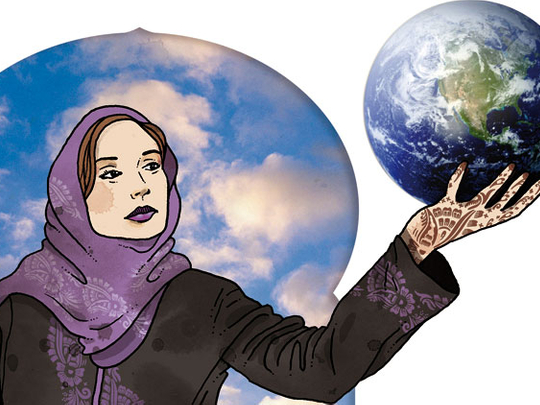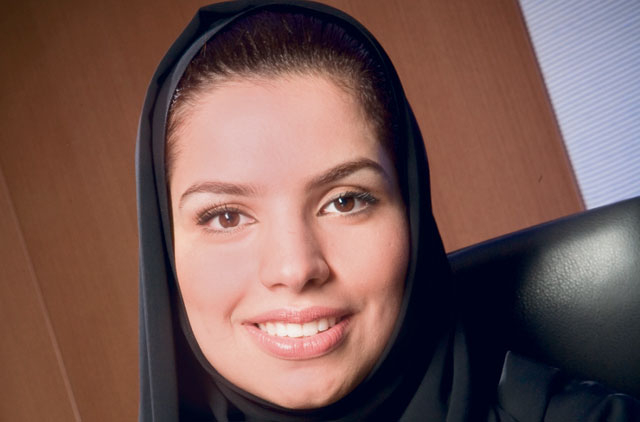
As the debate on feminism in the region gathers momentum, opinions on the matter are strongly divided. Some believe the so called Western concept of feminism has no place in the Arab world. Yet Arab women are still fighting for an equal place in society, academics and students argue.
Dr Monica Gallant, chair of the business department at Dubai Women's College, has been evaluating what form of feminism best fits the Arab context. Her paper titled The Application of Feminism in the Arab World: Research Perspectives, which won an Outstanding Paper award after it was published in the Education, Business and Society: Contemporary Middle Eastern Issues journal, argues that it is possible for Arab women to create a "sustainable, emancipatory movement by gradually challenging patriarchal discourses while still maintaining a connection to key societal norms".
Discussions on Arab feminism must consider Islamic principles and any successful feminist movement should be gradual and must take into account cultural views so as not to alienate women from their societies, Gallant said. "Women don't want to vary too much from what society expects from them."
Having lived in the UAE for 14 years, her research reveals the importance placed on expectations of women in the Arab world. This in turn affects how women view themselves.
"Arab women wouldn't want to see themselves as feminists because it is too Western and anti-men," she said.
Instead she observed that Arab women work within societal expectations to gradually gain freedom of choice for themselves by working with what society expects of them.
"While being a mother and a wife she tries to be an entrepreneur or employee," Gallant said. "She fulfils her home duties and tries to live her dream, which is tough because she has to be a superwoman to be able to do everything."
Social expectations
Gallant said in the Arab world the expectations of women to be wives and mothers are still very strong. "Women can't voluntarily admit to not wanting to become a wife or mother," she said, because some social expectations are still difficult for women to overcome.
To illustrate her point Gallant used the example of an unmarried woman moving out of her family's home to live alone.
Dr Suad Zayed Al Oraim, professor of sociology at UAE University, however, argued that "if a single woman is comfortable in that role it's up to her".
She said individuals are responsible for creating change which then goes on to become a social phenomenon. "Someone has to pioneer it," she said.
Using the same example, Suad said there is no civil law or Sharia (Islamic) law in the UAE preventing a woman from living alone.
"These are cultural laws; if a woman is willing to bear the consequences it's up to her," she said. "[But] Islam is not responsible for those consequences because it is cultural and we need to differentiate between tradition and religion."
Feminism inappropriate
There is no place for Westernised feminism in the Arab world due to existing cultural and religious differences in societies, some academics and students said.
Arab women are fighting for an equal place in society but not under the umbrella of feminism because the term indicates a gender struggle which is primarily a Western ideal, they said.
"The ideology of feminism came from the US and Europe and you can't sell it to Arab culture," said Suad. "If women in the UAE and other Arab countries want to create something new for themselves, it's up to them to do it."
Declaring an existence
Suad attended the region's first conference on Arab feminism in Beirut, Lebanon, last year. She said the purpose was to establish if feminism exists in any of the 22 Arab nations.
"In the Arab world the expression is not clear because it doesn't exist in the culture," she said. "Some countries understand Arab feminism from an Arab point of view and others from a Western one."
Suad added: "Yet women don't want to talk about it because it's not clear in the minds of a majority of women in the Arab world."
For Iraqi pharmacy student Sura Sa'ad, studying at the Ras Al Khaimah Medical and Health Sciences University, Arab women need to decide what they want.
"It is our duty as women to first declare what rights we want and second it is our responsibility to show ... these rights don't cross our traditions or religion," she said.
Misconceptions
"Women make up half of any society and if half of society has no rights or education then how will society ever develop?" said Sa'ad.
She added that some women mistake feminism or liberation as a right to dress however they want and go wherever they want. "[Feminism] is about respecting us and treating us equally to men so we can help in the process of development."
Sa'ad said a major problem with many Arab governments is that "they talk about women's rights but in reality they don't exist".
Similarly, Hassan Al Hassany, an architecture student at the Canadian University of Dubai, said: "It is all about male domination. There is no Arab country in which a woman rules or leads as president or prime minister. This gives you a good impression that Arab feminism doesn't fit in the Arab world."
Pioneering change
Sa'ad has lived in Iraq, Jordan and now in the UAE, which she says is the most respectful of women's rights to education and work.
Yet working women in the Arab world is nothing new, Suad emphasised. "There have been women in the workplace since the 1940s in countries such as Algeria, Egypt, Syria and Lebanon."
However, regarding Sa'ad's opinion about the UAE's social justice towards women, this could be in large part due to the initiatives of Her Highness Shaikha Fatima Bint Mubarak, Wife of the late Shaikh Zayed Bin Sultan Al Nahyan and Chairwoman of the UAE General Women's Union.
Shaikha Fatima pushed for Emirati women to excel in the development of their nation. Yet she does not regard herself as a feminist. She was once quoted as having said: "I see myself as being behind a great man and my role is limited to being a wife and mother to the sons of a great leader."
Islam and feminism
Dr Wassim Ahmad, professor of Islamic Studies at Preston University Ajman, said Islam has given women equal rights to men. "Islam has empowered women and given them rights they did not have in earlier societies," said Ahmad.
Suad defined feminism as a movement of social, political and economic change for the justice of women in sociological terms. To which Ahmad said: "Islam is not women versus men. The two genders play different roles in life which are intended to complement each other."
Suad added that Islam has already raised the status of women in society as sisters, mothers and wives.
"She is second to none," said Ahmad. "And if she has an inclination towards education and wants to further explore her capacities so as to contribute to any field of life, Islam gives her the freedom to do so. Yet how much this is demonstrated and applied in different societies and countries is a different question."
‘Women are at the centre of Arab society'
Ameenah Taher, Executive Director of Corporate Communications at Zabeel Investments shares her views on feminism
- Is there a place for feminism in the Arab world?
Not really, feminism works for those who don't receive the same as men. In the UAE, we are treated pretty equally to men, and in some respects get better treatment.
- Do you think women in the Arab world are oppressed?
If women want men to treat them better, it is up to us to raise our sons to treat women the way we want to be treated and show them the partnerships men and women can enjoy.
- Do you think Arab women need to be emancipated?
We are not slaves nor restricted from voting. We earn along similar lines to men. We receive equal rights to education, employment and healthcare. Anything seen as restrictive is usually self-imposed.
- What do you think the role of a woman is in Arab society?
Women are at the centre of Arab society. We run homes and add value in education. We are fostering a new generation of entrepreneurship and contribute financially to our own futures.
- As a successful working woman and mother what drives you?
My daughter. I want her to look at me with pride. When she grows up I hope she follows the career of her dreams, makes decisions for a better future and has conviction in her choices.
Do you think there is a place for feminism in the Arab world? Leave a comment by clicking on the 'Post a comment' link below.



